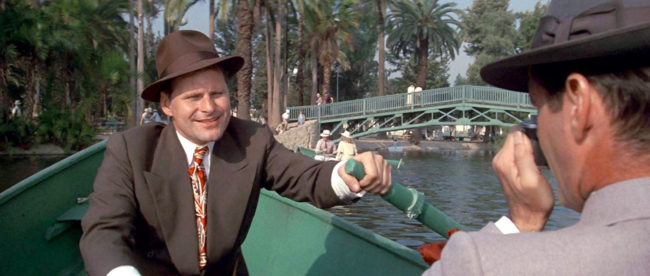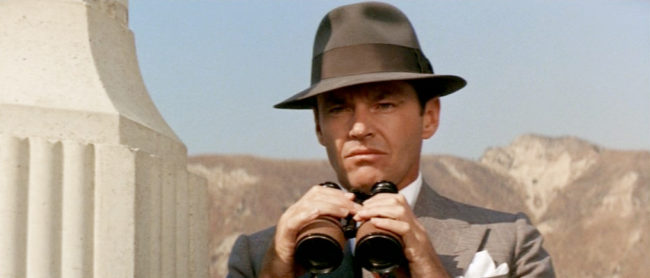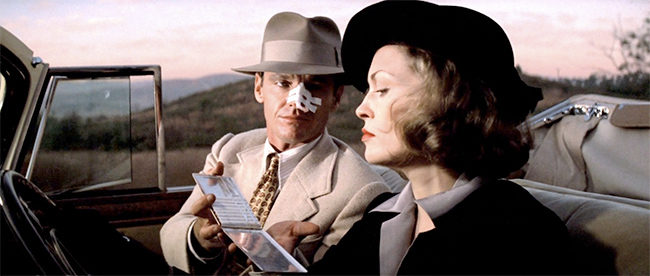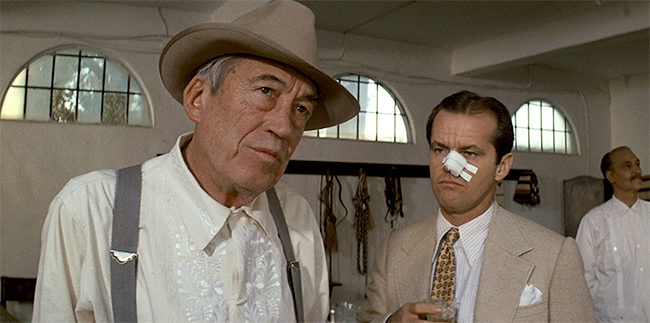Laemmle Theatres and the Anniversary Classics Series present a screening of one of the most memorable films of the 70s, the neo-noir mystery thriller, CHINATOWN. Nominated for 11 Academy Awards in 1974 (including Best Picture, Best Director, Best Actor Jack Nicholson and Best Actress Faye Dunaway), the film won the Oscar for the original screenplay by Robert Towne. Although it was set in a beautifully recreated 1930s universe, the film reflected the bitter cynicism and disillusionment of the Vietnam and Watergate era.
Towne was a Los Angeles native, and he had long been fascinated by the history of the city, where the sun-dappled settings hid tales of greed and corruption. The inspiration for the story was the water wars that had helped to shape the modern life of the city. These struggles over the city’s natural resources had taken place in the first decade of the 20th century; Towne moved the setting up to the 1930s, partly in order to combine this scorching social commentary with the spirit of classic detective novels penned by authors like Dashiell Hammett and Raymond Chandler.
Nicholson plays J.J. Gittes, a private eye who specializes in sordid cases of marital infidelity. But he gets himself into deeper territory when an investigation into a civic leader’s extramarital affair leads to a discovery of a massive conspiracy by big business interests to seize control of the city’s desperately needed water supply. Gittes’s sleuthing also leads him to uncover shocking cases of sexual abuse among the city’s upper crust. Dunaway plays a variation on the classic femme fatale of noir cinema, a beautiful heiress who is commanding on the surface but is secretly and tragically damaged by events in her past. John Huston plays her corrupt father, and the supporting cast includes John Hillerman, Perry Lopez, Diane Ladd, Burt Young, Bruce Glover, and James Hong.
Robert Evans, the successful head of Paramount Studios at the time, backed Towne’s screenplay and decided to make the film his first venture as a producer. When Evans took over as head of the studio in the 60s, one of his early successes was an adaptation of Ira Levin’s best-selling novel, Rosemary’s Baby, which became the first American movie of European director Roman Polanski. That film was a smash hit, and Evans hired Polanski again to direct Chinatown. Polanski had been reluctant to work in Hollywood since the murder of his pregnant wife, Sharon Tate, by the notorious Manson family in 1969. But Evans persisted, and Polanski brought his knowledge of the underside of Hollywood to his depiction of the city’s past, even changing the ending of Towne’s screenplay to reflect his own deep pessimism.
The film’s technical team—including cinematographer John Alonzo, production designer Richard Sylbert, and costume designer Anthea Sylbert—helped to realize the writer and director’s vision of decay beneath the elegant surfaces of Southern California. Jerry Goldsmith’s sultry score, highlighted by a melancholy trumpet solo, clinched the mournful mood.
Variety praised the achievement: “Roman Polanski’s American made film, his first since Rosemary’s Baby, shows him again in total command of talent and physical filmmaking elements.” Derek Malcom of the London Evening Standard wrote, “Polanski’s telling of his tale of corruption in LA is masterly—thrilling, humorous and disturbing at the same time—and brilliantly played by John Huston and Faye Dunaway as well as Nicholson.” The film was added to the National Film Registry of the Library of Congress in 1991.

Our panel to discuss the film will include actor Bruce Glover (Hard Times, Walking Tall, Diamonds Are Forever); assistant director Hawk Koch (who went on to produce such films as Heaven Can Wait, The Idolmaker, The Pope of Greenwich Village, Wayne’s World, and Primal Fear and later served as president of the Motion Picture Academy); and author Sam Wasson (who wrote the biography of Bob Fosse that served as the basis of the highly acclaimed miniseries, Fosse/Verdon, and is writing a new book on the seminal films of the 70s).
CHINATOWN screens Thursday, June 27 at 7PM at the Royal Theatre in West LA. Click here for tickets.
Format: DCP.



